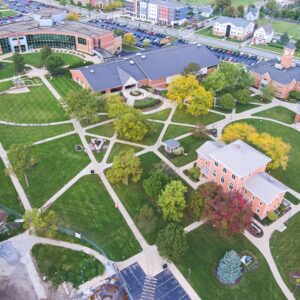The Importance of College Campus Visits: Getting a Feel for the Environment

Choosing the right college is a pivotal decision in a student’s life, one that will shape their future in countless ways. While academic programs, rankings, and financial considerations play significant roles in this decision, there’s an often-overlooked factor that can make all the difference: the campus visit. Visiting a college campus provides prospective students with an invaluable glimpse into the academic, social, and physical environments of the institution. This firsthand experience is crucial in making an informed choice about where to spend the next four years.
Why College Campus Visits Matter

Understanding Campus Culture
Every college has a unique culture that can’t be fully understood through brochures or websites. The atmosphere of a campus, the demeanor of its students, and the overall vibe of the place can only be truly grasped in person. When you visit a campus, you get to observe student interactions, witness campus traditions, and experience the energy that pervades the environment. These intangible elements can significantly influence your comfort level and sense of belonging at a particular school.
First-Hand Experience
Experiencing campus life firsthand allows you to engage all your senses. You can see the layout and architecture of the buildings, hear the sounds of student life, smell the food in the dining halls, and feel the overall ambiance. This sensory information helps create a more vivid and accurate picture of what it would be like to live and study there. It can also help you identify aspects of the college that resonate with you or, conversely, aspects that might be deal-breakers.
Academic Environment

Classroom Experience
One of the most important aspects of a college visit is the opportunity to sit in on classes. This gives you a sense of the teaching styles, class sizes, and level of student engagement. Observing a class in session allows you to gauge whether the academic environment aligns with your learning style. Additionally, interacting with faculty and current students can provide insights into the academic support and resources available.
Academic Facilities
Touring the academic facilities, such as libraries, laboratories, and study spaces, is crucial. These are the places where you will spend a significant portion of your time. Assessing the availability and quality of these resources helps you understand how well the college supports your academic pursuits. Look for up-to-date technology, comfortable study environments, and ample resources that can aid your learning.
Social Environment

Student Life
The social environment of a college is just as important as its academic offerings. During your visit, explore the dorms, dining halls, and common areas to get a feel for student life. Pay attention to the activities and interactions happening around you. Are students engaged and happy? Are there clubs and organizations that match your interests? These observations can help you determine if you will find a supportive and enjoyable social community.
Campus Safety
Safety is a top priority for any student and their family. Evaluate the safety measures in place on campus, such as lighting, security patrols, and emergency response systems. Speak with current students about their experiences and perceptions of safety. Feeling secure on campus is essential for a positive college experience.
Physical Environment

Campus Layout
Understanding the geographical layout of a campus is essential for day-to-day convenience. Is the campus walkable, or will you need a bike or car? Are the academic buildings, dormitories, and dining facilities easily accessible? A well-planned campus layout can significantly enhance your college experience by reducing stress and making your daily routine more efficient.
Local Community
The surrounding community plays a significant role in your college experience. Take the time to explore the local area, including off-campus housing, transportation options, and entertainment venues. The relationship between the college and the local community can impact your overall satisfaction and quality of life. A vibrant and welcoming local community can enhance your college years with cultural, social, and recreational opportunities.
Financial and Logistical Considerations

Cost Implications
Understanding the cost of living on and off-campus is crucial for financial planning. During your visit, inquire about the cost of housing, meals, and other daily expenses. Additionally, explore financial aid and scholarship opportunities available at the college. Knowing the full financial picture can help you make a more informed decision and avoid unexpected financial burdens.
Travel Logistics
Planning a campus visit involves several logistical considerations. Determine the best times to visit, what to bring, and how to make the most of your trip. Research travel accommodations and plan your itinerary to include all the essential aspects of campus life. If you are visiting multiple campuses, plan your travel route efficiently to maximize your time and resources.
Making the Most of Your Visit

Preparation
Proper preparation is key to a successful campus visit. Start by researching the college thoroughly, understanding its programs, culture, and values. Prepare a list of questions to ask admissions officers, faculty, and current students. Schedule appointments with relevant departments, such as admissions, financial aid, and specific academic departments.
During the Visit
Engage actively during your visit. Attend information sessions, take guided tours, and participate in any available class observations. Interact with current students and faculty to gain their perspectives. Take detailed notes and photographs to help you remember important details later. This information will be invaluable when comparing different colleges.
Post-Visit Reflection
After your visit, take time to reflect on your experience. Review your notes and photos, and compare them with your initial expectations and other colleges you have visited. Discuss your impressions with family, friends, and mentors to gain different perspectives. This reflection process will help you clarify your thoughts and make a more informed decision.
Virtual Campus Visits

Advantages and Limitations
While in-person visits are ideal, virtual campus tours can also provide valuable insights, especially when travel is not feasible. Virtual tours allow you to explore the campus remotely and can be a great initial step in your college search process. However, they cannot fully replicate the experience of being on campus, interacting with students, and feeling the environment firsthand.
Maximizing Virtual Visits
To make the most of virtual visits, participate in online information sessions, webinars, and virtual Q&A sessions with admissions officers and current students. Use virtual tours to narrow down your list of potential colleges and plan in-person visits to your top choices. Combining virtual and in-person visits can provide a comprehensive understanding of the colleges you are considering.
Conclusion
Visiting college campuses is a crucial step in the college selection process. It allows you to experience the academic, social, and physical environments firsthand, helping you make an informed and confident decision. College Forum is the best platform to find detailed information about the best colleges and plan your campus visits effectively. Prioritize campus visits in your decision-making process to ensure that you choose the college that best fits your needs, aspirations, and personality.
By taking the time to visit and explore, you are investing in your future and setting the stage for a successful and fulfilling college experience. So, start planning your visits today and take the first step toward finding your perfect college match.






